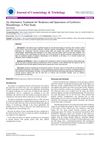146 citations,
September 2013 in “Advances in nutrition” Bariatric surgery can cause serious mineral deficiencies, requiring better patient education and monitoring.
 9 citations,
November 2014 in “Journal of Cutaneous Medicine and Surgery”
9 citations,
November 2014 in “Journal of Cutaneous Medicine and Surgery” Many dermatologists in Saudi Arabia recommend vitamins and minerals for hair loss, often based on personal experience rather than strong evidence.
20 citations,
June 2020 in “Journal of Advanced Research” High-dose vitamin A and E with zinc improved blood sugar control and insulin function in diabetics, but may cause hair loss.
 May 2022 in “Maǧallaẗ Buḥūṯ Al-Tarbiyyaẗ Al-Nawʿiyyaẗ (Print)”
May 2022 in “Maǧallaẗ Buḥūṯ Al-Tarbiyyaẗ Al-Nawʿiyyaẗ (Print)” Eating a high inositol diet significantly improves insulin resistance and hormone levels in women with PCOS.
1 citations,
November 2022 in “Molecules/Molecules online/Molecules annual” Some calcium supplements have more calcium than their labels say, and a few have less.
 August 2024 in “Nutrition Bulletin”
August 2024 in “Nutrition Bulletin” GLP-1 receptor agonists help with weight loss but need to be combined with other treatments for best results.
 18 citations,
October 2014 in “Experimental Biology and Medicine”
18 citations,
October 2014 in “Experimental Biology and Medicine” Eating vitamin A affects hair growth and health by changing cell signals in mice.
 January 2024 in “Polski Merkuriusz Lekarski”
January 2024 in “Polski Merkuriusz Lekarski” Pica disorder in central Iraq is mainly found in females and is linked to low iron levels; treatment with iron improves most patients.
5 citations,
September 2023 in “Nutrients” Soy protein with isoflavones reduces wrinkles and improves skin hydration in postmenopausal women.
3 citations,
October 2023 in “Cosmetics” Healthy lifestyle changes can significantly improve skin health as you age.
 37 citations,
October 2021 in “Nutrients”
37 citations,
October 2021 in “Nutrients” Vitamin D might help regulate insulin in the body, but taking Vitamin D supplements doesn't clearly prevent or improve type 2 diabetes. More research is needed.
 33 citations,
April 2009 in “Clinical and Experimental Dermatology”
33 citations,
April 2009 in “Clinical and Experimental Dermatology” Psychological factors like depression may be more important than zinc, folate, and vitamin B12 levels in causing scalp pain in people with hair loss.
 January 2018 in “International journal of food and nutrition research”
January 2018 in “International journal of food and nutrition research” Intermittent iron and nutritional supplements can help reduce hair loss.
 10 citations,
January 2012 in “International Journal of Trichology”
10 citations,
January 2012 in “International Journal of Trichology” The study found no link between anxiety, vitamin B12, folate, TSH, ferritin, zinc levels, and trichodynia in telogen alopecia patients.
August 2022 in “Nutrients” Nutritional supplements may help improve hair growth in female pattern hair loss.
 September 2024 in “Journal of Family Medicine and Primary Care”
September 2024 in “Journal of Family Medicine and Primary Care” Primary health physicians in Saudi Arabia need better guidelines for treating hair loss with vitamins and minerals.
 September 2023 in “Journal of Parasite Science”
September 2023 in “Journal of Parasite Science” The dog's skin condition improved significantly after seven days of treatment.
 January 2015 in “Journal of cosmetology & trichology”
January 2015 in “Journal of cosmetology & trichology” Mesotherapy might help make eyebrows thicker and darker for some people.
 37 citations,
October 2004 in “Adolescent Medicine Clinics”
37 citations,
October 2004 in “Adolescent Medicine Clinics” Bariatric surgery may help severely obese teenagers but has risks and requires careful patient selection and long-term care.
 15 citations,
May 1997 in “Annals of Internal Medicine”
15 citations,
May 1997 in “Annals of Internal Medicine” Tamoxifen caused hair loss in a 52-year-old woman.
 January 2021 in “Middle East journal of applied sciences”
January 2021 in “Middle East journal of applied sciences” Zinc is essential for plant growth and human health, but many soils lack enough zinc, affecting crops and potentially leading to health problems.
6 citations,
June 2021 in “EClinicalMedicine” ALRV5XR significantly improves hair density in women with hair loss and is well-tolerated.
 December 2022 in “Cosmetics”
December 2022 in “Cosmetics” The food supplement improved hair growth and strength in people with a certain type of hair loss and had no major side effects.
 13 citations,
December 2012 in “Frontiers in bioscience”
13 citations,
December 2012 in “Frontiers in bioscience” Vitamin D and estrogen may help protect heart and kidney health, and maintaining sufficient vitamin D levels could be especially beneficial for African Americans, postmenopausal women, and people with chronic kidney disease.
 3 citations,
November 2020 in “Biological Trace Element Research”
3 citations,
November 2020 in “Biological Trace Element Research” Men with hair loss may lack zinc, copper, and vitamin D; supplements could help.
 5 citations,
May 2023 in “Frontiers in immunology”
5 citations,
May 2023 in “Frontiers in immunology” Environmental factors like diet and vitamin levels, especially Vitamin D, can affect autoimmune diseases differently, with lifestyle changes potentially improving outcomes.
 February 2023 in “Aesthetic Cosmetology and Medicine”
February 2023 in “Aesthetic Cosmetology and Medicine” Medicinal plants in nutricosmetics contain compounds that can improve skin and hair health.
 2 citations,
May 2022 in “Cosmetics”
2 citations,
May 2022 in “Cosmetics” Further research is needed to understand how the microbiome affects hair loss in Alopecia Areata.
 14 citations,
October 2020 in “Natural Products and Bioprospecting”
14 citations,
October 2020 in “Natural Products and Bioprospecting” Various treatments, including FDA-approved drugs, natural products, and oral supplements, can help with hair loss, but a patient's medical history and potential allergies should be considered when choosing a treatment.
 1 citations,
November 2015 in “Indian Journal of Clinical Biochemistry”
1 citations,
November 2015 in “Indian Journal of Clinical Biochemistry” The conference presented findings on how vitamin D levels, genetic factors, and lifestyle choices like smoking and yoga affect various health conditions and diseases.






















